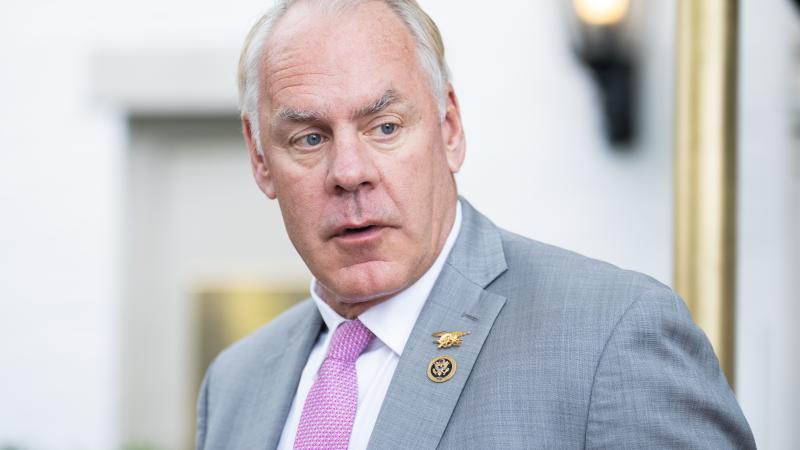Johnson's Homeland funding deal and spending package likely to anger conservative Republicans
The deadline to pass a federal funding package before a partial government shutdown is March 22 and the contents of the DHS aspect was reportedly in dispute until Tuesday. The final text reflecting the agreement hasn't been released yet.
The Department of Homeland Security funding compromise that House Speaker Mike Johnson, R-La., said was struck on Tuesday is likely to frustrate conservatives and deficit hawks.
The head of the conservative House Freedom Caucus was not part of the negotiations that led to the compromise, which would pave the way for avoiding a partial government shutdown if Johnson puts the bill on the House floor for a vote.
The deadline to pass a federal funding package before a partial government shutdown is March 22 and the contents of the DHS portion was reportedly in dispute until Tuesday.
Johnson announced that a deal had been reached on Tuesday but the final legislative text of the DHS compromise and the overall spending package has not been released yet.
"An agreement has been reached for DHS appropriations, which will allow completion of the FY24 appropriations process," Johnson said in a statement. "House and Senate committees have begun drafting bill text to be prepared for release and consideration by the full House and Senate as soon as possible."
Johnson's office was not available for comment on the details of the package before press time.
"I came to DC to stop Washington's spending and secure the border, and will be voting against any swampbus. I urge my colleagues to heed Madison's words and do the same," wrote Rep. Andy Ogles, R-Tenn., on X after the announcement that a deal was struck. In another posting, Ogles referred to the deal as “Swampbus The Sequel: House Of Hypocrisy."
Rep. Thomas Massie, R-Ky., said the House has returned to the "Ryan-Boehner swamp mode where the omnibus is written behind closed doors" and scheduled for a floor vote.
“Members are told to take it or leave it, and although Republicans control the House, more Democrats vote for it than Republicans because it spends more money than when Pelosi was in charge," Massie wrote Tuesday on X.
Reacting to the compromise, Brandon Judd, president of the Border Patrol Union, said more money for DHS and Border Patrol isn't going to solve the migrant crisis at the southern border.
"There's no policy and that's the problem. Again, I don't care about money. We don't need money. We don't need infrastructure, technology, resources. We need policy, and there is no policy and this is strictly based upon dollars and cents. And when we do that, then the taxpayer is the one who suffers because they're throwing money into a black hole," he said on the "Just the News, Not Noise" TV program. "That's not going to stop any of this problem."
Rep. Bob Good, R-Va., chairman of the House Freedom Caucus, and a group of more than 40 Republicans wrote to Johnson on Monday advocating for him to include the "core elements" of the House-passed Secure the Border Act, H.R. 2, in the spending package.
The bill would increase the "civil penalties for unlawful entry into the United States and [establish] criminal penalties for overstaying a visa" and "[limit] the authority of DHS to grant parole (temporary admission into the United States for urgent humanitarian reasons or significant public benefit that is granted on a case-by-case basis)."
The legislation passed the House in May but hasn't seen a vote in the Democratic-led Senate.
A spokesperson for the House Freedom Caucus said Tuesday that Good is unaware of what is in the compromise that Johnson said has been reached.
"I think it was a Johnson Biden Compromise," he said. "Rep Good was not at the table."
Former House Speaker Kevin McCarthy was ousted from his position for putting a 45-day temporary funding bill called a Continuing Resolution (CR) on the House floor, which House conservatives opposed. It passed with more votes from Democrats than Republicans. There was a group of 8 Republicans who joined all Democrats in the chamber to vote in favor of a motion to vacate the chair, which led to McCarthy's ouster.
Since then, Johnson has put a series of short-term funding bills on the House floor that passed with Democratic votes. The current funding package appears not to be any different.
FY2024 spending is currently on track to exceed the previous year and the final spending package is unlikely to reverse that trend.
According to U.S. Treasury data on spending since the start of this fiscal year, "compared to the federal spending of $2.46 trillion for the same period last year (Oct 2022 - Feb 2023) our federal spending has increased by $227 billion."
Good previously told Just the News he would regard the passage of another CR without any major border reforms or significant spending reductions as a missed opportunity and a failure.
Despite that, it doesn't appear that Johnson's speakership is in jeopardy.
"I will acknowledge the fact that at least we're dealing with an honest broker. Someone who is a conservative at heart, someone who wants to do the right things, someone who we trust, in terms of his integrity and his desire to do conservative things. Someone who is far more open and accessible, whose core is aligned with the conservative center of the Republican conference," Good said on Feb. 16.















